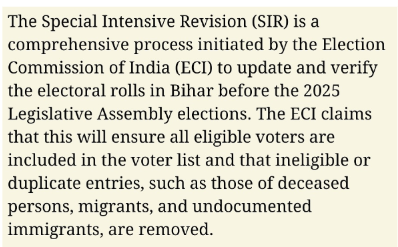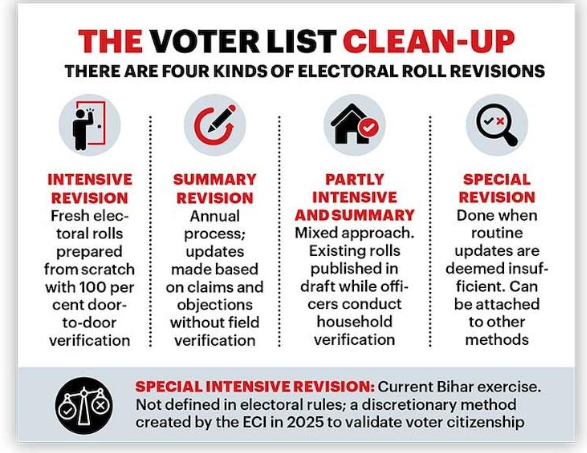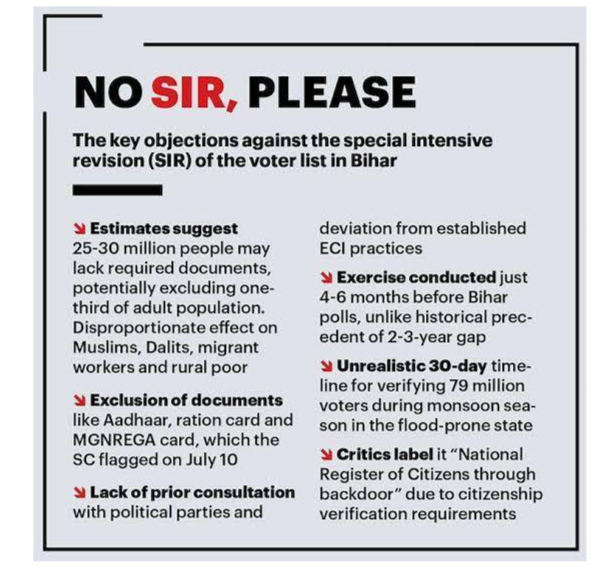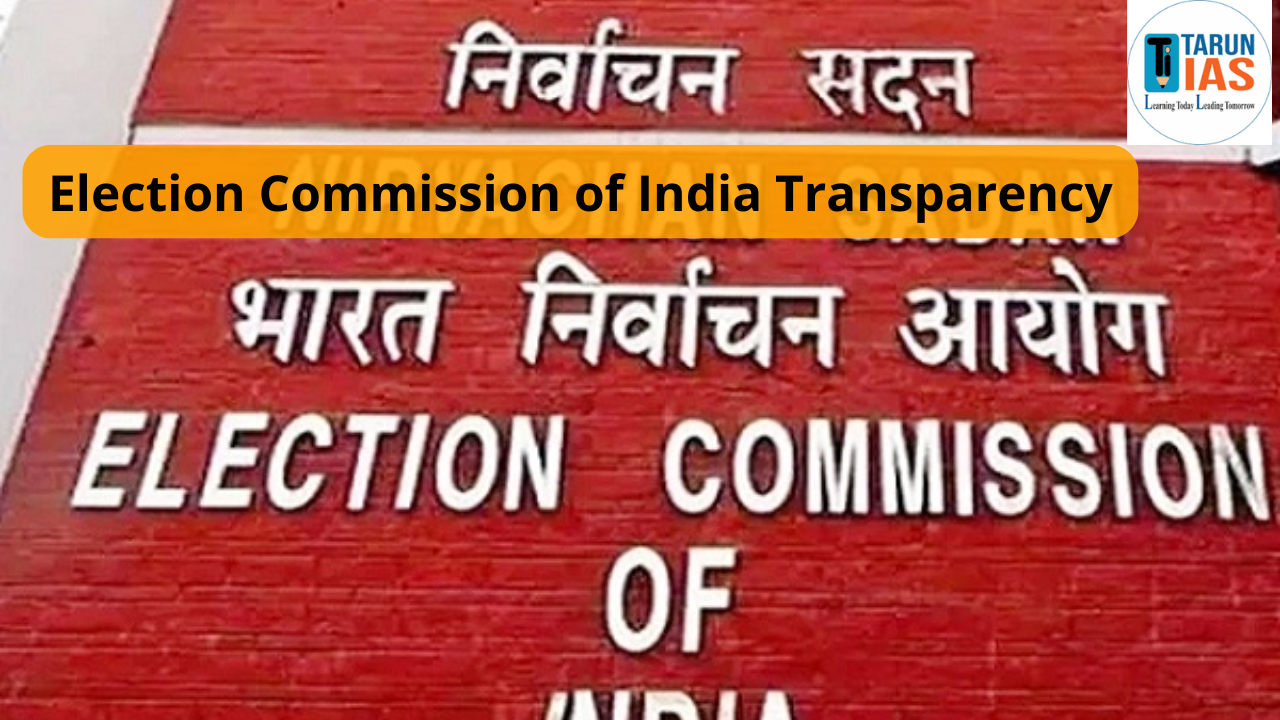Election Commission of India Transparency Concerns Introduction
- Recently, the Election Commission of India (ECI) has come under scrutiny, with multiple members of civil society and political leaders raising questions about its functioning.
- One of the most prominent concerns revolves around the Special Intensive Revision of Electoral Rolls in Bihar, which has been criticized for lacking transparency.
- Additionally, allegations of vote manipulation and the mismanagement of elections in Karnataka and Maharashtra have intensified the debate surrounding the ECI’s credibility and effectiveness. These issues have brought to light the broader concern of transparency in the electoral process in India, calling into question the role and conduct of the Election Commission.


What is Electoral Transparency?
- Electoral transparency refers to the visibility and openness of all processes, information, and resources involved in elections. From voter registration and candidate selection to ballot counting and funding disclosures, electoral transparency ensures that every element of the election process is subject to public scrutiny.
- Key Aspects of Electoral Transparency:
- Openness in Election Procedures: Clear and accessible election rules, processes, and guidelines enable voters and political parties to understand how elections are conducted.
- Information Availability: Voter lists, candidate details, and election results must be made available to the public in a timely and accessible manner.
- Funding Transparency: Political party donations, campaign financing, and election-related expenses must be disclosed to prevent corruption and ensure fairness.
The Importance of Electoral Transparency
- Ensuring Accountability in the Electoral Process: Electoral transparency serves as a powerful tool for holding the Election Commission of India (ECI), political parties, and candidates accountable for their actions. With transparent procedures, it becomes much harder for malpractices to go unnoticed or unchallenged.
- Example: Public disclosure of election expenditure by candidates and political parties allows citizens and watchdog organizations to monitor spending. This makes it easier to identify violations, such as exceeding the cap on election spending, ensuring that the election remains fair and free from undue influence.
- Lowering Electoral Fraud and Malpractice: Transparency in the election process significantly reduces the opportunities for fraud and manipulation. When election procedures are open and well-documented, the chances of fraudulent activities such as vote tampering, rigging, and booth capturing diminish.
- Example: The presence of polling agents from various political parties at polling stations, along with the use of videography during vote counting, helps deter bogus voting and tampering. This transparency ensures the integrity of the election and helps detect fraudulent activities promptly.
- Gaining Public Trust and Legitimacy: One of the primary benefits of electoral transparency is its ability to build public trust in the electoral system. When the electoral process is open, transparent, and accountable, it instills confidence in voters, political parties, and the broader electorate. This trust is essential for the legitimacy of the elected government and the stability of the democratic system as a whole.
- Promoting Informed Decision-Making by Voters: Transparency provides voters with access to crucial information about candidates, including criminal antecedents, financial backgrounds, and political funding sources. This enables voters to make informed decisions, knowing the true profiles of those seeking office.
- Example: The mandatory disclosure of assets and liabilities by candidates, as enforced by the ECI, allows voters to evaluate the financial standing of candidates and identify any potential conflicts of interest. This transparency ensures that voters can make more educated choices when casting their ballots.
- Enhancing Voter Participation: When voters perceive the electoral process as fair and transparent, they are more likely to actively engage with it. This can include actions like registering to vote, casting ballots, and participating in political discourse. The assurance of fairness encourages greater civic engagement.
- Example: Easily accessible voter rolls that are regularly updated and available for public inspection allow citizens to verify their inclusion and encourage new voter registrations. This fosters a sense of ownership and responsibility, leading to higher voter turnout and greater civic participation.
- Safeguarding Fundamental Rights: Electoral transparency is deeply connected to fundamental rights such as the right to information (under Article 19(1)(a)) and the right to vote. Without transparency, these rights can be undermined, leading to public distrust and weakened democratic processes.
- Example: In 2018, the Supreme Court of India struck down the Electoral Bond Scheme, highlighting the public’s right to know the sources of political funding. This landmark ruling emphasized that transparency in funding sources is crucial for ensuring that voters are fully informed and can make decisions based on complete information.

Key Issues Affecting Electoral Transparency in India
- Political Funding Transparency: One of the most significant issues facing electoral transparency in India is the lack of transparency in political funding. The Electoral Bond Scheme, introduced by the government in 2017, aimed to curb black money by routing donations through formal banking channels. However, critics argue that it has increased opacity rather than transparency.
- Key Concerns:
-
-
- Anonymous Donations: The Electoral Bond Scheme allows anonymous donations, making it difficult for voters to know who is funding political parties. This raises fears of quid pro quo arrangements and potential corporate influence over policy-making.
- Lack of Accountability: Critics, including the Election Commission of India (ECI), argue that the scheme promotes crony capitalism and distorts policy decisions in favor of anonymous donors, undermining public trust.
-
- Electronic Voting Machines (EVMs): Electronic Voting Machines (EVMs), integral to modern-day elections, have faced scrutiny regarding their transparency and integrity. Opposition leaders frequently describe EVMs as “black boxes”, raising concerns that the internal workings of these machines are not transparent enough for public verification.
- Key Concerns:
-
-
- Lack of Voter Verification: Although the Voter Verifiable Paper Audit Trail (VVPAT) system was introduced to allow voters to see a paper slip of their vote, the ECI currently mandates counting of only five randomly selected EVMs per constituency. Opposition parties are demanding 100% VVPAT verification to ensure accuracy in vote counting.
- In the 2019 General Elections, some opposition parties raised concerns about EVM tampering, demanding increased transparency in the use of these machines to ensure the integrity of the vote.
-
- Electoral Rolls: The accuracy and transparency of electoral rolls is another critical issue. Many reports have highlighted discrepancies such as duplicate entries, missing names, and inaccurate data. This has led to allegations of fraudulent voting and disenfranchisement.
-
-
- Duplicate Entries: There have been reports of individuals having multiple entries on voter lists, sometimes across different constituencies or even states.
- Deletion of Genuine Voters: Conversely, genuine voters, particularly migrant workers and marginalized communities, often find their names missing from the rolls.
- Aadhaar Linkage: The proposal to link Aadhaar with voter IDs has raised concerns about the voluntary nature of the process potentially becoming mandatory, which could lead to the exclusion of legitimate voters.
-
- Transparency in the Appointment of Election Commissioners: The appointment of Election Commissioners has been a source of controversy. In 2023, the Chief Election Commissioner (CEC) and other Election Commissioners were appointed under the Election Commissioners Act, 2023, which altered the selection committee.
-
-
- Government Influence: The new Act replaced the Chief Justice of India (CJI) with a Union Cabinet Minister in the selection committee, raising concerns that the government would have a majority in the committee, affecting the independence of the Election Commission.
- The shift in the selection process has raised fears about the independence of the Election Commission, with critics arguing that it could undermine the Commission’s ability to function impartially.
-
- Restricting Access to CCTV Footage During Polling: The Conduct of Election Rules 1961 were recently amended, restricting access to CCTV footage during the polling process. This change has raised concerns about the transparency of polling stations and vote counting.
-
-
- Limited Access for Political Parties: The Leader of Opposition (LoP) has raised objections, asserting that providing access to CCTV footage allows political parties to monitor and scrutinize the process, ensuring fair elections.
-
- Lack of Transparency in Special Intensive Revision: The Special Intensive Revision process, especially in states like Bihar, has faced criticism for its lack of transparency. The Election Commission has been accused of not providing adequate information about deleted names and the reasons behind their removal.
-
- Non-Disclosure: The ECI’s refusal to release the full list of deleted names and reasons for their removal makes it difficult for political parties and the public to verify the legitimacy of the process.
- Impact on Marginalized Communities: Such deletions often disproportionately affect marginalized groups, eroding trust in the system.
Way Forward
- Increased VVPAT Verification: The Voter Verifiable Paper Audit Trail (VVPAT) system was introduced to provide voters with a paper slip confirming their vote. However, currently, the Election Commission of India (ECI) mandates that only five randomly selected EVMs per constituency are checked against VVPAT slips. This is not enough to ensure the accuracy and reliability of the Electronic Voting Machines (EVMs).
- Adopt a statistically robust sample size for VVPAT verification to increase confidence in the EVM results. In cases of discrepancies, the full manual counting of VVPAT slips should be initiated for the affected constituency.
- Online Updates with Transparency: A major concern regarding electoral rolls is the lack of real-time updates, which leads to discrepancies and confusion. Making the electoral roll update process more dynamic and transparent is essential for building public trust.
-
- Publish Voter Rolls: One of the key reforms needed in India’s electoral process is the prompt release of consolidated voter rolls and real-time voter turnout data. Publish Form 17C data and CCTV footage from polling booths to address concerns about potential discrepancies and build confidence in the electoral process.
- Political Parties Under RTI: A crucial step towards enhancing transparency is to bring political parties under the Right to Information (RTI) Act. Currently, political parties, despite receiving significant public funding and operating with public interest, are not fully accountable to the RTI. Bringing them under RTI would allow citizens to seek detailed information about party finances, donations, and expenditures, ensuring better transparency in funding and resource allocation.
- Reduce Anonymous Donation: One of the major concerns regarding political funding transparency is the high threshold for anonymous cash donations. Currently, donations up to ₹20,000 are allowed to remain anonymous, creating opportunities for unaccounted political funding.
- Access for Observers and Party Agents: For effective monitoring of the electoral process, it is vital that domestic and international observers, as well as party agents, have unhindered access to polling and counting centers.















